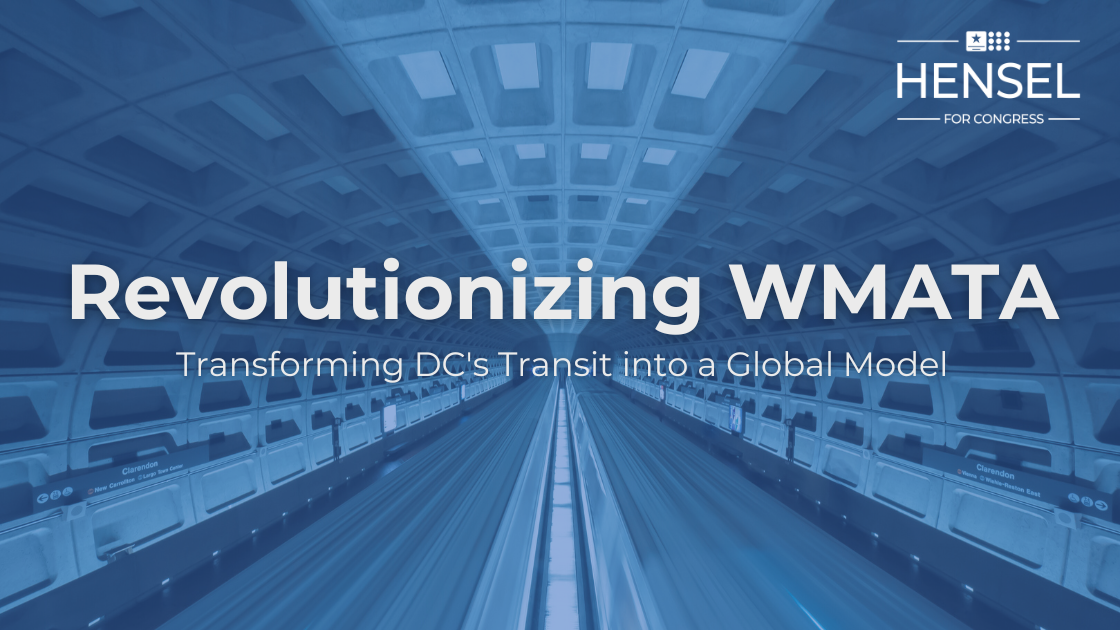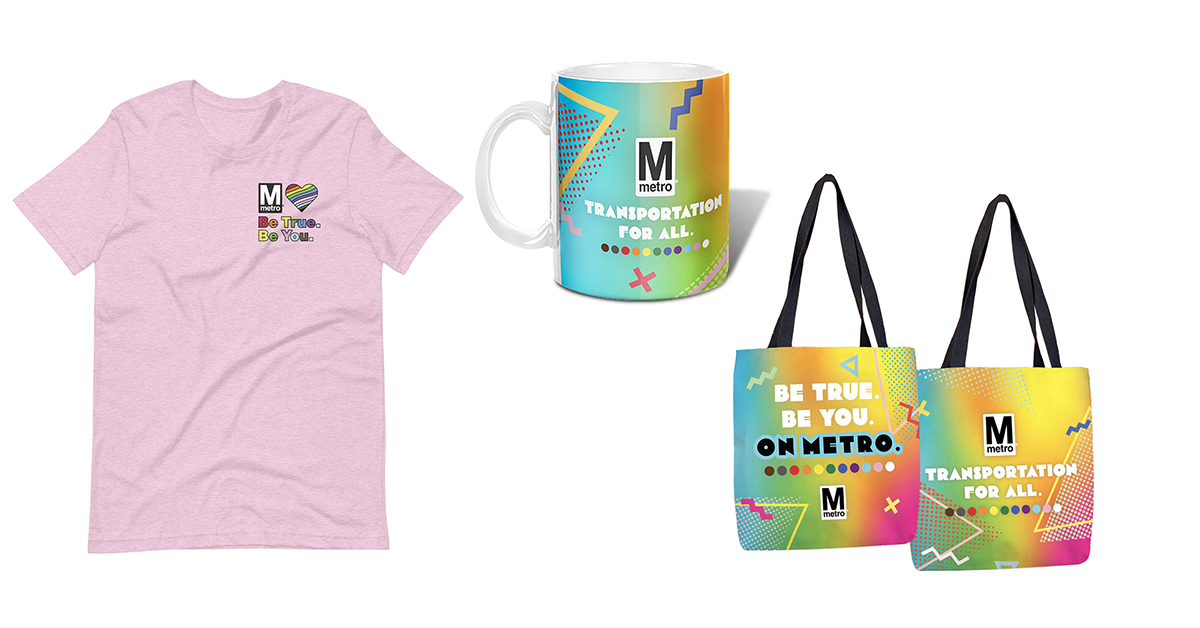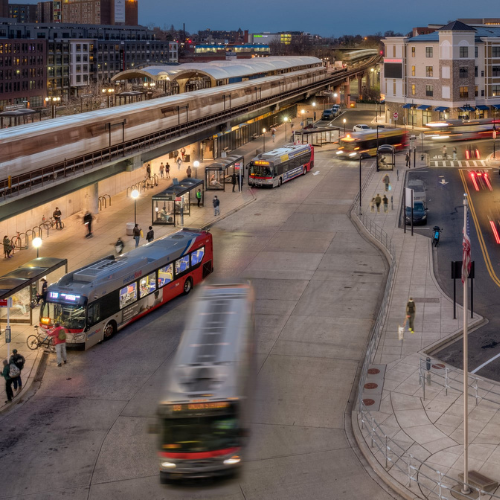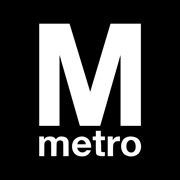Fixing the Metro: A Bold Plan for Modern Mobility
Championing a transformative vision for WMATA, I aim for unparalleled transparency and innovative funding to redefine urban mobility.

Our public transit system is failing, and the consequences are severe. For too long, we've allowed mismanagement and lack of transparency to undermine the efficiency and reliability of WMATA. It's time to face the hard truth: the system is broken, and our commuters are suffering. We need a transformative, revolutionary approach to public transportation that ensures every resident has access to safe, efficient, and affordable transit options.
An Urgent Need for Change
WMATA faces a massive budget shortfall, threatening service cuts and fare increases that will hit commuters hard. Facing a $750 million deficit, Metro is considering slashing services and raising fares. This is unacceptable. Our region depends on a reliable transit system—not one crippled by financial mismanagement and a lack of accountability.
In Northern Virginia, innovation and progress aren't just buzzwords—they're necessities. We can't afford to let our public transit lag behind. If the complexities of multiple state and DC governments can cooperate and find proper funding with integrated transit systems and modalities, we can set an example for the rest of the country—and the world. We should strive to make New York and Boston envy DC, not the other way around.
Moreover, if we're serious about stopping climate collapse, we must get behind public transportation in a big way. With DC's unemployment rate over 5% (Bureau of Labor Statistics ), why not put people to work building the best transit system imaginable?
The Proposal: Transparency, Innovation, and Federal Support
To transform WMATA into a world-class transit system, we need a comprehensive plan centered on transparency, technological innovation, environmental sustainability, and innovative funding. By tackling these key areas, we can rebuild trust, enhance efficiency, and secure the resources necessary to create a system that serves everyone effectively.
1. Unmatched Transparency & Open Data
We must implement full transparency at WMATA. All financial expenditures, service performance metrics, and operational data should be readily available to the public in real-time and in machine-readable formats. PDFs ARE NOT ACCEPTABLE FOR REPORTING DATA. This isn't about bureaucracy—it's about building trust and allowing riders, developers, and stakeholders to see exactly where their money is being spent and how decisions are made.
By making data openly accessible, we empower third parties to develop apps and services that enhance the rider experience. Transparency fosters innovation and community collaboration.
2. Technological Innovation and Modernization
Our transit system must embrace cutting-edge technology to improve efficiency and reliability:
- Advanced Technology Integration: Implement real-time data analytics, AI-driven predictive maintenance for trains and buses, and enhance digital platforms for riders.
- Open-Source Solutions: Adopt open-source software to reduce costs and improve efficiency, reflecting our commitment to transparency and collaboration.
- Cybersecurity and Infrastructure Protection: Protect WMATA's digital infrastructure against cyber threats, ensuring continuous and safe operations.
- Innovation Labs: Establish teams dedicated to researching and implementing new transit technologies and practices.
3. Environmental Sustainability
If we're serious about combating climate collapse, we must invest wholeheartedly in public transportation:
- Green Energy Initiatives: Transition WMATA's fleet to electric or hybrid vehicles to reduce emissions and improve public health.
- Sustainable Practices: Invest in energy-efficient buildings and stations and utilize renewable energy sources within WMATA operations.
- Climate Commitment: Position WMATA as a leader in environmental stewardship, setting a precedent for transit systems nationwide.
4. Innovative Funding Mechanisms
Relying on fare increases and service cuts is a failing strategy. It's time to explore diverse funding sources that don't burden riders and ensure WMATA's financial stability:
- Conditional Federal Matching Funds: Advocate for federal support tied to clear performance milestones. By meeting targets for efficiency, reliability, and rider satisfaction, WMATA can secure essential funding while demonstrating accountability.
- Public-Private Partnerships (P3s): Engage in responsible collaborations with private entities to fund infrastructure projects without compromising public interest. This includes technology partnerships, station enhancements, and innovative service offerings that bring in capital and expertise.
- Alternative Revenue Streams: Expand income sources beyond traditional fares and government subsidies. For example, WMATA's merchandise store, DC Metro Gift Shop , while not a complete solution to the budget shortfall, exemplifies how creative initiatives can engage the community and generate additional revenue. We should think outside the box and explore similar opportunities:
- Transit-Oriented Development (TOD): Leverage WMATA-owned land for mixed-use developments that generate lease income and foster community growth.
- Advertising and Sponsorships: Increase tasteful advertising partnerships, including digital displays and naming rights, to boost revenue without detracting from the rider experience.
- Monetizing Underutilized Assets: Identify and utilize underused resources, such as excess parking facilities or air rights above stations, to create new income streams.
- Innovative Financing Tools: Utilize infrastructure bonds, green bonds, and impact investments that attract funding for specific projects with measurable social and environmental benefits.
- Job Creation and Economic Growth: Invest in transit projects that create jobs, especially in communities with higher unemployment rates. By hiring locally and providing workforce development programs, we stimulate economic growth and promote equity.

The same old ideas aren't working—why do we keep trying them? By embracing these innovative funding mechanisms, we can secure WMATA's financial future without burdening riders. Let's put people to work building the best transit system imaginable.
5. Empowering Riders and Employees
We need to foster genuine engagement between WMATA and its riders and employees:
- Inclusive Decision-Making : Establish rider councils and employee advisory boards to provide input on service improvements and policies.
- Feedback Platforms : Create accessible platforms—both digital and physical—where feedback isn't just collected but acted upon.
- Workforce Training : Offer apprenticeship and training programs in transportation-related fields, providing career opportunities and supporting our broader educational initiatives.
6. Eliminating Conflicts of Interest and Strengthening Governance
WMATA's leadership must be beyond reproach:
- Strict Policies to Prevent Conflicts of Interest : Ensure decisions are made in the best interest of the community, not individual agendas.
- Transparent Leadership Appointments : Publicly disclose the qualifications and potential conflicts of interest of WMATA leadership.
- Regional Collaboration : Promote integrated transportation planning with neighboring jurisdictions to create a seamless transit network.
A Vision for the Future
This plan isn't just about fixing what's broken—it's about building a transit system that sets the standard for the nation and the world. By embracing transparency, demanding accountability, and investing in innovation and sustainability, we can transform WMATA into a model of efficiency and reliability.
Imagine a Metro system where trains run on time, facilities are clean and safe, and riders feel their voices are heard. A system where technology enhances the user experience, leadership is responsive and ethical, and our commitment to the environment is unwavering. This isn't a distant dream—it's a reachable goal if we have the courage to make bold changes.
By putting people to work building the best transit system, we address unemployment and stimulate economic growth, all while improving the quality of life for residents. If we can achieve this in the complex environment of DC, Maryland, and Virginia, we can set an example for transit systems across the nation.
Why This Plan Works
- Real Accountability: By tying funding to performance metrics and mandating transparent reporting, WMATA is incentivized to deliver tangible results. This ensures that federal support is effectively utilized to improve service quality and reliability.
- Technological Advancement: Implementing advanced technologies like AI-driven predictive maintenance, real-time data analytics, and open-source platforms reduces operational costs, minimizes downtime, and enhances the rider experience.
- Environmental Leadership: Transitioning to electric and hybrid fleets and adopting sustainable practices not only reduces emissions but also positions WMATA as a pioneer in eco-friendly transportation—a critical step in combating climate change.
- Community Engagement: Fostering inclusive decision-making processes and creating platforms for genuine feedback ensures that the system evolves based on the needs and insights of those who use and operate it daily.
- Financial Responsibility: Transparency in financial operations, combined with innovative funding strategies, enables us to reduce wasteful spending, optimize resource allocation, and avoid burdening riders with fare hikes.
- Enhanced Service and Economic Growth: Investing in the transit system stimulates job creation and economic development, particularly in underserved communities. Improved reliability and efficiency attract more riders, increasing revenue and reducing traffic congestion.
We Must Act Now
The current trajectory of WMATA threatens our region's economic vitality, quality of life, and the environment. We can't stand by while budgets are slashed, services are cut, and riders are left stranded. It's time to take decisive action.
Let's revitalize our public transit system, restore trust through transparency, embrace technological innovation, and redefine what effective, equitable urban mobility looks like. Together, we can make Metro a source of pride for our community—a system that not only serves us but sets an example for the nation and the world. We should strive to make New York and Boston envy DC, not the other way around.
Join me in making this vision a reality. Together, we can fix WMATA and build a better future for all commuters in Northern Virginia and beyond. Let's lead the way in modern mobility, environmental stewardship, and technological innovation.
Additional Resources





